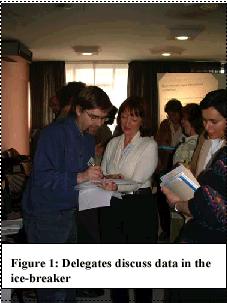
Thematic Working Group 5
Stochastic Thinking
Dave Pratt
Centre for New Technologies Research
in Education
University of Warwick (dave.pratt@warwick.ac.uk)
This section of the proceedings reports on the work of the Working Group 5 on Stochastic Thinking, which incorporated issues pertaining to the teaching and learning of both probability and statistics, as well as the interface between. This group was led by four organisers: Dave Pratt (UK, Chair), Carmen Batanero (Spain), Rolf Biehler (Germany) and Michel Henry (France). 17 papers were accepted and discussed within this working group. They represented work from authors spread across four continents and ten countries.
 The working group began with an ice-breaker (see figure
1), planned and led by Dor Abrahamson (USA). We were required to collect
data about each other, a process which succeeded in helping us to get to
know each other but which also raised some interesting issues about emergent
behaviour. Perhaps because of this ice-breaker, the group subsequently engaged
in productive discussion, a central aim of the conference.
The working group began with an ice-breaker (see figure
1), planned and led by Dor Abrahamson (USA). We were required to collect
data about each other, a process which succeeded in helping us to get to
know each other but which also raised some interesting issues about emergent
behaviour. Perhaps because of this ice-breaker, the group subsequently engaged
in productive discussion, a central aim of the conference.
There were two special sessions; one involving the hands-on use of computer software, namely NetLogo and Fathom and another final session in which the working group divided into smaller teams with the task of pulling together the main threads of the previous discussion.
The other four sessions were divided into four themes: Teacher Education, Computer-based Tools, Statistical Thinking and Probabilistic Thinking. In each session, papers relevant to that theme were briefly re-introduced with the aim of reminding the group about their key ideas. The aim was that most of the session was devoted to asking specific clarification questions or raising important discussion points. In most sessions that aim was achieved though sometimes there was more presentation and less discussion than had been envisaged.
Some important conclusions were drawn. The Teacher Education theme focussed on the impoverished nature of training for teachers of statistics, who were often not especially knowledgeable in that area. There was also concern about the accuracy of many text books on statistics.
The work on Computer-based Tools highlighted the importance of technology for the teaching and learning of stochastics. New approaches for the spatial dynamic representation of stochastic ideas were discussed, and the potential for students to appreciate probability distribution as an emergent phenomenon was acknowledged as exciting and novel.
The Statistical Thinking theme reported on studies into the mean and graphing. There was also discussion about the important role that the construction of a task and the subsequent social interaction has on the quality of observed statistically-related discussion.
Finally the work on Probabilistic Thinking put forward new theoretical perspectives and evidence that recognised the context-sensitive nature of student’s probabilistic thinking. This research also proffered the view that a modelling perspective on probability was especially accessible through advances in technology.
These proceedings include in the subsequent pages all of the papers from each of the four themes. Each theme is briefly introduced by the chair for that theme.
At the end of the conference, there was a feeling that much progress had been made, not just in terms of the discussion content, but also in terms of establishing a new network that will support research in this important area in the future. We look forward to the continued work of this group at the next CERME conference.
List of themes: